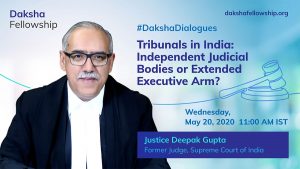Justice Deepak Gupta, former judge of the Supreme Court of India, was part of the 5-judge bench in Rojer Mathew v. South Indian Bank. In November 2019, the Hon’ble Supreme Court came out with its verdict in this case. The constitutional issue involved here goes to the heart of judicial independence – the creation and institutional structuring of tribunals with judicial powers. While this issue has been the subject matter of several SC verdicts prior to this case, the facts involved in Rojer Mathew were unusual. The Ministry of Finance had introduced an entire Part XIV in Finance Act, 2017, doing away with the selection process for twenty-six tribunal members created under existing laws, and replacing them with one selection process. The new process was too simple to be true: The Central Government would notify the Rules for appointment of members to each of these tribunals from time to time. Additionally, some upper age limits were specified for the Chairperson and other members of these tribunals.
This one-stroke measure, which also entailed abolishing eight such tribunals and transferring their functions to seven other tribunals without properly taking stock of the capacity and existing work-log in these seven tribunals, was duly challenged before the Supreme Court. For starters, the whole measure was designated a ‘money bill’, thereby bypassing legislative scrutiny by the Rajya Sabha. Additionally, the new procedure for selection and appointment of tribunal members fell afoul of various guidelines laid down in previous SC verdicts, all of which were meant to secure judicial independence.
In a #DakshaDialogues on Wednesday the 20th of May 2020 between 1100 and 1200 hours, Justice Gupta will be in conversation with Dr. Ananth Padmanabhan, Dean, Daksha Fellowship, on Tribunals in India: Independent Judicial Bodies or Extended Arm of the Political Executive? Justice Gupta had struck a part-concurring, part-dissenting note in the 5-judge bench verdict. Explaining his reasons for the same, Justice Gupta will share his thoughts on:
• The history of, and various policy objectives sought to be served by, tribunalisation in India;
• The reality of India’s tribunals;
• The push back against tribunalisation in order to preserve judicial independence;
• The decision in Rojer Mathew, and how it seeks to strike a balance between efficiency and independence;
• The case for institutional reform and the way ahead.
LINK TO REGISTER: bit.ly/dakf3
To know more about the Daksha Fellowship and to avail 100% tuition waivers before closure of second round of admissions, visit www.dakshafellowship.org

